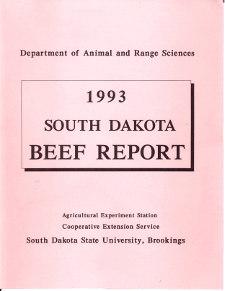Document Type
Report
Report Number
93-5
Publication Date
1993
Keywords
oat hulls, ammoniation, growing diets
Summary
Eighty-one steer calves were fed growing diets that contained 50% of either 1) ground brome hay (BROME), 2) unground oat hulls (OH), or 3) unground oat hulls treated with 3% ammonia and enough water to raise the moisture content to 20% (NH3-OH). Treated oat hulls were allowed to react for 63 days prior to feeding. Daily gains of NH3-OH fed steers were 18 and 13% greater than those of OH and BROME fed steers, respectively, during the 88-day study (P<.01). Dry matter intakes were not affected by diet (P>.10). However, feed efficiency was 13% better for NH3-OH fed steers than steers fed OH and 9% better than those fed the BROME diet (Pc.05). Calculated NEm and NEg estimates for the brome hay, untreated and 9 treated oat hulls used in this study were 53.9 and 31.9, 51.0 and 29.2, and 64.7 and 40.8 Mcal/cwt DM, respectively. Oat hulls respond well to ammonia treatment and may contain as much as 23% more net energy than brome hay in calf growing diets.
Number of Pages
4
Format
application/pdf
Language
en
Publisher
South Dakota State University
Rights
Copyright © 1993 South Dakota State University.
Recommended Citation
Birkelo, C. P.; Thomson, D. U.; and Lounsbery, J., "Ammoniated Oat Hulls for Growing Calves" (1993). South Dakota Beef Report, 1993. 6.
https://openprairie.sdstate.edu/sd_beefreport_1993/6

